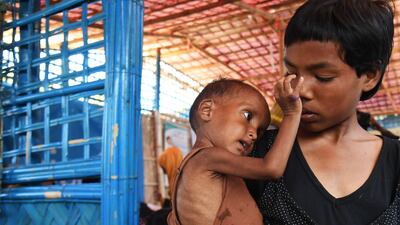The United Nations Security Council has called on Myanmar to rein in its military campaign in Rakhine state and allow hundreds of thousands of Muslim Rohingya driven out by the violence to return home.
In a unanimous statement backed by China, the council member and regional power closest to Myanmar, the council strongly condemned the violence that has forced more than 600,000 Rohingya to flee across the border to Bangladesh.
The council expressed “grave concern” over human rights violations, “including by the Myanmar security forces” against the Rohingya such as killing, sexual violence and burning of homes and property.
It called on the government “to ensure no further excessive use of military force in Rakhine state, to restore civilian administration and apply the rule of law.”
The statement included most of the demands contained in a draft resolution presented last month by Britain and France, but that measure ran into strong opposition from China, a supporter of Myanmar’s former ruling junta.
China had indicated it was willing to resort to its veto power to block a resolution, but Beijing finally agreed to a statement during negotiations, diplomats said.
Since late August, more than 600,000 Rohingya have been driven from their homes by an army campaign that the United Nations has described as ethnic cleansing.
Myanmar authorities say the military operation is aimed at rooting out Rohingya militants who staged attacks on police posts.
The Rohingya have faced decades of discrimination in Buddhist-majority Myanmar and have been denied citizenship since 1982, which has effectively rendered them stateless.
The Security Council’s statement calls on Myanmar to cooperate with the United Nations and encourages UN secretary-general Antonio Guterres to appoint a special advisor on Myanmar.
British deputy UN ambassador Jonathan Allen said despite the decision to drop the resolution, the council was issuing a strong, united message.
“The important thing is the content,” Mr Allen said. “Gaining a very strong, unanimous statement I think was the real prize here.”
His view was echoed by his ultimate boss, British foreign secretary Boris Johnson, who said: “The UK has repeatedly called on the Burmese security forces to protect all civilians and act now to stop the violence and allow humanitarian aid to urgently reach all those who need it. The UNSC has today joined us in that call, with this historic Presidential Statement on Burma.
“I am encouraged to see state counsellor Aung San Suu Kyi making important steps forward, including establishing a domestic body to deliver humanitarian and development assistance in Rakhine, and making efforts to promote interfaith and intercommunal harmony, including a recent visit to northern Rakhine. The UK will be watching closely to ensure that the Burmese security forces do not attempt to frustrate these efforts.
“I also applaud the work of the Bangladesh government, which is working hard to ensure the refugees receive urgent aid. The recent agreements between Burma and Bangladesh are welcome, and I hope they can now make swift progress on the voluntary, safe, and dignified returns of refugees to Burma. The Burmese security forces must take steps to ensure the right conditions are in place for refugees to return.”

